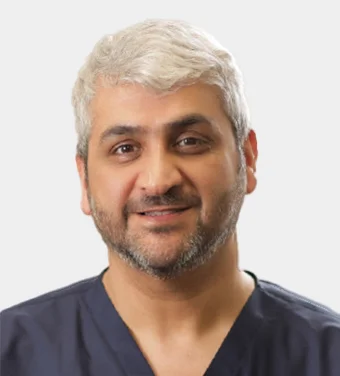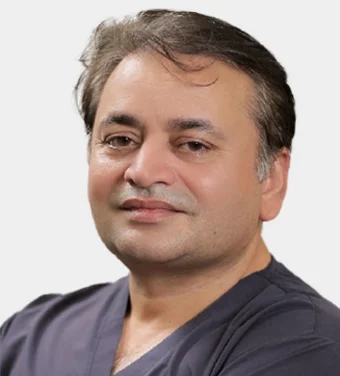
Uncover the Transformative Potential of Vagus Nerve Stimulation at IBS Hospital. From epilepsy management to depression relief and post-stroke recovery, our advanced treatment fosters healing and renewed quality of life. Experience a path towards improved health and vitality with this ground-breaking therapy.
What is Vagus Nerve Stimulation ?
About one-third of people with epilepsy do not fully respond to anti-seizure drugs. Vagus nerve stimulation may be an option to reduce the frequency of seizures in individuals who haven't achieved control with medications.
Vagus Nerve Stimulation may also be helpful for people who have not responded to intensive depression treatments, such as antidepressant medications, psychological counseling (psychotherapy), and electroconvulsive therapy (ECT).
The Food and Drug Administration (FDA) has approved vagus nerve stimulation for individuals who:
- Are 4 years old or older.
- Have focal (partial) epilepsy.
- Have seizures that aren’t well-controlled with medications.
What are the FDA-approved criteria for using Vagus Nerve Stimulation for the treatment of depression in adults?
The FDA has also approved Vagus Nerve Stimulation for the treatment of depression in adults who:
- Have chronic, treatment-resistant depression.
- Haven’t shown improvement after trying four or more medications, electroconvulsive therapy (ECT), or both.
- Continue standard depression treatments in conjunction with vagus nerve stimulation.
What are the risks of undergoing implanted Vagus Nerve Stimulation?
For most people, vagus nerve stimulation is safe. However, it does carry some risks, both from the surgery to implant the device and from the brain stimulation itself.
Surgery Risks: Surgical complications with implanted vagus nerve stimulation are rare and are similar to those associated with other types of surgery. They include:
- Pain at the incision site where the device is implanted.
- Infection.
- Difficulty swallowing.
- Vocal cord paralysis, which is usually temporary but can be permanent.
Side Effects After Surgery: Some of the side effects and health problems associated with implanted Vagus Nerve Stimulation can include:
- Voice changes.
- Hoarseness.
- Throat pain.
- Cough.
- Headaches.
- Shortness of breath.
- Difficulty swallowing.
- Tingling or prickling of the skin.
- Insomnia.
- Worsening of sleep apnea.
For most people, side effects are tolerable. They may lessen over time, but some side effects may remain bothersome for as long as you use implanted vagus nerve stimulation. Adjusting the electrical impulses can help minimize these effects. If side effects are intolerable, the device can be turned off temporarily or permanently.
How should you prepare for undergoing implanted Vagus Nerve Stimulation?
Its important to carefully weigh the pros and cons of implanted vagus nerve stimulation before deciding to undergo the procedure. Ensure you understand all your treatment options and that both you and your doctor agree that implanted vagus nerve stimulation is the best choice for you. Ask your doctor to explain what you should expect during the surgery and after the pulse generator has been implanted.
Food and Medications: You may need to stop taking certain medications ahead of time. Your doctor may also ask you to refrain from eating the night before the procedure.
What can you expect from Vagus Nerve Stimulation?
Before the Procedure;
Before surgery, your doctor will conduct a physical examination. You may need blood tests or other tests to ensure there are no health concerns that might complicate the procedure. Your doctor may prescribe antibiotics before surgery to prevent infection.
During the Procedure
- Surgery to implant the vagus nerve stimulation device can be performed on an outpatient basis, though some surgeons recommend an overnight stay.
- The surgery typically takes between one to one and a half hours. You may remain awake with local anesthesia to numb the surgery area, or you may be under general anesthesia and unconscious.
- The surgery does not involve your brain. Two incisions are made: one in your chest or in the axillary (armpit) region, and the other on the left side of the neck.
- The pulse generator is implanted in the upper left side of your chest. While intended as a permanent implant, it can be removed if necessary.
- The pulse generator, about the size of a stopwatch and battery-powered, is connected to a lead wire. This wire is guided under your skin from your chest to your neck, where its attached to the left vagus nerve through the second incision.
After the Procedure
- The pulse generator is activated during a doctors office visit a few weeks after surgery. It can be programmed to deliver electrical impulses to the vagus nerve at various durations, frequencies, and currents. Stimulation typically starts at a low level and is gradually increased, based on your symptoms and side effects.
- Stimulation is programmed to turn on and off at specific intervals, such as 30 seconds on and five minutes off. You may experience tingling sensations or slight pain in your neck and temporary hoarseness when the nerve stimulation is active.
- The stimulator does not detect seizure activity or depression symptoms. Once activated, it operates on and off at intervals set by your doctor. You can use a hand-held magnet to trigger stimulation at a different time, for instance, if you sense an impending seizure.
- The magnet can also be used to temporarily deactivate the vagus nerve stimulation, which may be necessary for activities such as public speaking, singing, or exercising, or if you experience swallowing problems while eating.
- Regular doctor visits are necessary to ensure the pulse generator is functioning correctly and hasn't shifted. Consult youur doctor before undergoing any medical tests, like MRI, that might interfere with your device.
What is the effectiveness of implanted Vagus Nerve Stimulation?
- Implanted vagus nerve stimulation is not a cure for epilepsy, but many individuals experience a reduction in seizure frequency, often by 20 to 50 percent. The intensity of seizures may also lessen.
- It can take months, or even a year or longer, of stimulation before a significant reduction in seizures is noticed. Vagus Nerve Stimulation may also shorten the recovery time after a seizure. People who have received vagus nerve stimulation for epilepsy treatment may also see improvements in mood and quality of life.
- Research on the benefits of implanted vagus nerve stimulation for treating depression is still mixed. Some studies suggest that the benefits for depression accumulate over time, and it may take at least several months of treatment before any improvements in depression symptoms are observed. Implanted vagus nerve stimulation doesn’t work for everyone and is not intended to replace traditional treatments.
- Studies investigating implanted vagus nerve stimulation as a treatment for conditions such as Alzheimer’s disease, headaches, and rheumatoid arthritis have been too small to draw definitive conclusions about its effectiveness for these issues. More research is needed.
Our team of experts that make it possible
Meet the team of highly specialised and experienced neurosurgeons, neurologists, orthopedicians, and other experts in the field of neurology and spine care. Our team is dedicated to providing personalised and compassionate care to each patient, with the goal of helping them achieve the best possible outcomes.

Dr. Sachin Kandhari
Senior Neurosurgeon

Dr. Dewaker Sharma
Senior Neurosurgeon

Dr. Vikas Gupta
Senior Neurosurgeon

Dr. Gaurav Sharma
Senior Sports Physiotherapist

Dr. Sachin Samuel
Senior Neuro Physiotherapist

Dr. Ankur Dhandha
Anaesthetist

Dr Ankush Arora
Anaesthetist

Dr Amarjyoti Yadav
Anaesthetist
IBS Hospital Empowers Your Treatment with Cutting-edge Technology
We continuously incorporate cutting-edge technologies from around the world into our offerings, such as a surgical system that allows for precise and confident complex procedures. We use magnetic stimulation to treat certain neurological conditions and create personalised brain maps for tailored treatment plans. Nerve monitoring during surgeries ensures the nervous system is not compromised, and a robotic exoskeleton aids in mobility issues. Our goal at IBS Hospital is to provide the best care possible, utilising the latest and most innovative technologies available.


